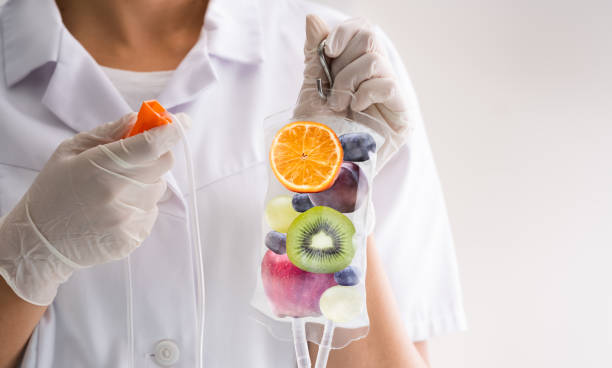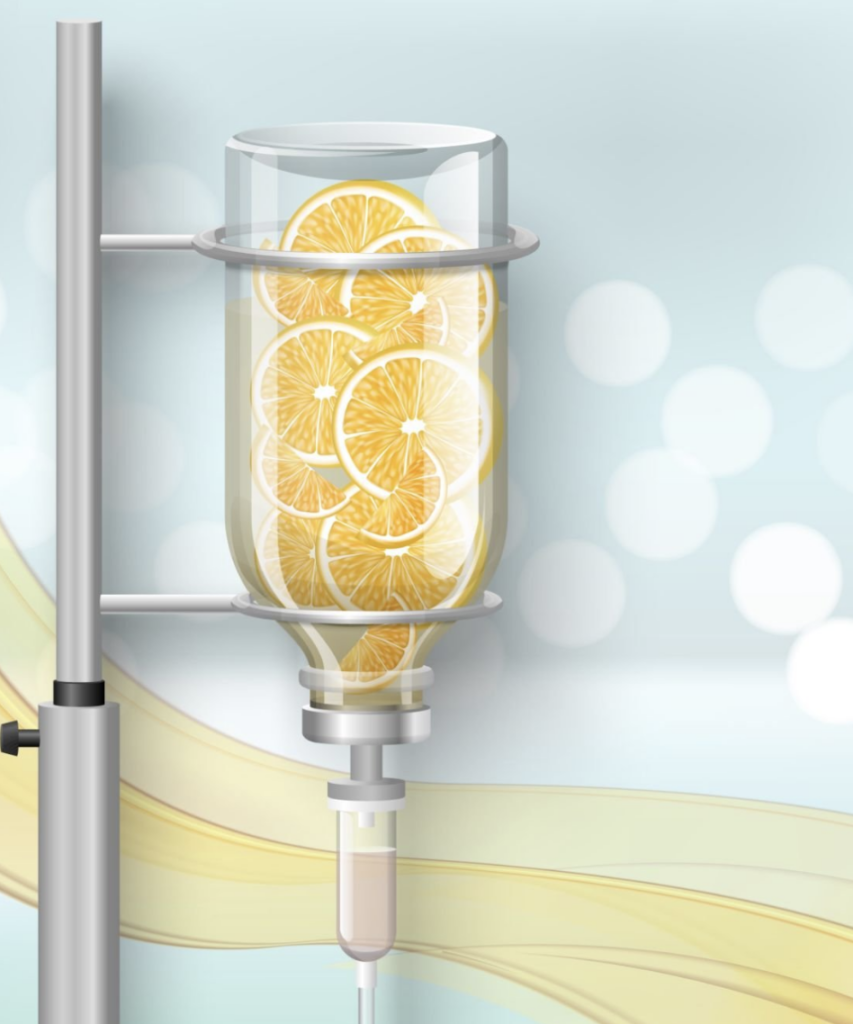Vitamin drips have gained popularity in recent years, with claims ranging from enhanced energy to improved skin health. But what exactly are vitamin drips, and how do they work?
In the pursuit of optimal health and well-being, people are increasingly looking for new ways to increase their energy. Vitamin drips, commonly known as intravenous (IV) therapy, have evolved as a popular technique of delivering nutrients straight into the bloodstream. Vitamin drips have piqued many people’s interest by promising a rapid and effective way to alleviate nutritional deficiencies and improve general wellness. This article will explore the science behind vitamin drips, including how they operate, their possible advantages, and the factors to consider before embarking on this exciting path of health supplementing. Let’s take a look at vitamin drips to see if they live up to the hype or offer a more complex set of health options.

Understanding Vitamin Drips
Definition & Composition
Vitamin drips, also known as intravenous (IV) vitamin treatment, are a form of alternative medicine in which vitamins, minerals, and other nutrients are administered directly into the bloodstream via an IV drip. These drips typically contain a combination of vitamins, including vitamin C and B vitamins, as well as minerals such as magnesium and calcium. Some vitamin drips contain amino acids, antioxidants, and other nutrients.
The mix of vitamin drips varies according to the patient’s specific demands and desired goal. For example, a drip targeted to increase energy levels may have larger doses of B vitamins, whereas a drip designed to improve skin health may contain more vitamin C and antioxidants.

The Science Behind Vitamin Drips
Mechanism of Action
Vitamin drips, also known as intravenous (IV) vitamin treatment, entail injecting a solution containing vitamins and minerals directly into the bloodstream via a vein. Vitamin drips work by bypassing the digestive system, allowing the body to absorb and utilize nutrients more efficiently.
The solution’s high concentration of vitamins and minerals is thought to provide a variety of health benefits, including increased energy, improved immunological function, and decreased inflammation. Vitamin C, in particular, is known to work as an antioxidant, preventing cellular damage caused by free radicals.
Absorption and Bioavailability
Vitamin drips have a better bioavailability of vitamins and minerals than oral supplements since they are infused directly into the bloodstream. This improves the body’s ability to absorb and utilize nutrients.
Vitamin drips can also be modified to match individual needs and treat specific health concerns. However, it is crucial to note that the efficacy of vitamin drips varies according to the individual and their specific health condition.
Overall, while there is some evidence that vitamin drips may have health advantages, further research is needed to completely evaluate their efficacy and risk. Before starting any type of vitamin therapy, you should check with a healthcare expert.

Potential Benefits of Vitamin Drips
Vitamin drips have been popular in recent years as a quick and easy approach to increase nutritional levels. While the efficacy of vitamin drips remains debatable, certain potential benefits have been identified.
Boosting Immunity
Vitamin drips may assist to strengthen the immune system by supplying the body with necessary vitamins and minerals. Vitamin C, for example, is known to improve immune function and prevent infection. A high dose of vitamin C administered by a vitamin drip may help to strengthen the immune system and avoid disease.
Enhanced Hydration
Vitamin drips can also promote hydration. Vitamin drips contain fluids and electrolytes that can swiftly rehydrate the body, making them a popular choice for athletes as well as individuals suffering from dehydration caused by illness or alcohol intake.
Detoxification and Antioxidant Support
Some vitamin drips include antioxidants and other detoxifying agents. Glutathione, for example, is an antioxidant that protects cells from harm and promotes liver function. Receiving a glutathione drip may help to boost the body’s natural detoxification processes while also improving overall health.
While these possible benefits are appealing, it is crucial to stress that vitamin drips should not be considered a substitute for a balanced diet and lifestyle. It is always preferable to consult with a healthcare expert before attempting any new therapies or supplements.
Evaluating Effectiveness
Clinical Studies and Research
Several clinical trials have been undertaken to determine the efficacy of vitamin drips. One study published in the Journal of Alternative and Complementary Medicine discovered that intravenous vitamin C therapy may help cancer patients with fatigue and mood disorders. However, more research is required to confirm these findings and discover the best dosages.
Another study published in the Journal of Clinical Oncology discovered that high-dose vitamin C therapy did not increase survival rates in individuals with advanced disease. This study emphasizes the significance of undertaking robust clinical studies to determine the efficacy of vitamin drips.
Expert Opinions
The usefulness of vitamin infusions is debatable among integrative medicine experts. Some feel they can deliver a fast nutritional boost to the body, while others are doubtful of their effectiveness.
Dr. Mark Hyman, a functional medicine practitioner, believes that vitamin infusions may be beneficial for people who have nutrient deficiencies or chronic illnesses. However, he warns that they should not be used as a replacement for a balanced diet and lifestyle.
Dr. David Gorski, a surgical oncologist and blogger, claims that there is insufficient scientific data to support the use of vitamin infusions. He believes that the high expense and potential hazards of these medicines may exceed any potential advantages.

Safety and Risks
Possible Side Effects:
While vitamin drips are generally regarded as harmless, there are some potential adverse effects that people should be aware of. These may include:
- Nausea and vomiting.
- Headaches
- Dizziness
- Allergic responses.
- Infection at the injection site.
It is crucial to note that these adverse effects are uncommon and usually mild. Individuals who suffer any of these symptoms should call their healthcare physician right once.
Contraindications and Precautions
Certain people should not receive vitamin infusions or should take special measures when doing so. This includes:
- People with kidney or liver illness
- Pregnant or nursing ladies
- Individuals with specific medical issues, such as diabetes or heart
- Individuals using specific drugs, such as blood thinners.
Individuals should discuss their medical history and any drugs they are taking with their healthcare professional before obtaining a vitamin drip. In addition, vitamin drips should only be administered by a licensed healthcare provider in a sterile environment.
Overall, while vitamin drip treatment may have some benefits, individuals should assess the risks and benefits before receiving one.

Comparing Vitamin Drips to Oral Supplements
Many people rely on oral supplements to meet their vitamin and mineral requirements. However, vitamin drips have gained popularity in recent years. How do the two methods compare?
Absorption
One of the primary distinctions between vitamin drips and oral supplements is how they are absorbed by the body. Before nutrients may be taken via oral supplements, the digestive system must break them down. This process can take time and may result in nutritional loss.
In contrast, vitamin drips are delivered directly into the bloodstream. This means that the nutrients are quickly available to the body. As a result, they may be more beneficial for patients who have digestive problems that impair nutritional absorption.
Dosage
When comparing vitamin drips to oral supplements, dose is also an important issue. Oral supplements are often packaged in fixed doses that may not be appropriate for everyone. For example, a person who requires more of a specific nutrient may need to take additional pills or a greater dosage.
A vitamin drip allow you to adjust your dosage for each individual. This enables a more targeted approach to nutrient supplementation.
Convenience
When it comes to convenience, oral vitamins may have the advantage. They can be taken anywhere, including home, work, and on the go. Vitamin drip treatments, on the other hand, necessitate a trip to the clinic or medical facility.
However, other folks might prefer the ease of a vitamin drip. For example, busy people who may forget to take their supplements on a regular basis may find it more convenient to book a vitamin drip visit.
Cost
When comparing vitamin drips to oral supplements, you should also consider cost. Oral supplements are typically less expensive than vitamin infusions, which require specialised equipment and medical professionals to administer.
However, vitamin infusions may be more cost-effective in the long run. Because they are delivered directly into the bloodstream, the body is able to absorb more nutrients. This indicates that fewer treatments may be required to obtain the intended effects.
Overall, vitamin infusions and oral supplements have their advantages and disadvantages. The optimum approach will be determined by each individual’s needs and preferences.

Personalization of Vitamin Drip Therapy
Vitamin drip therapy is a type of intravenous nutrition therapy that administers vitamins and minerals directly into the bloodstream. The therapy is extremely individualized, with the nutrient solution adapted to each individual’s exact needs.
Custom Formulations
One of the primary advantages of vitamin drip therapy is the possibility to produce personalized formulations. The nutrient solution can be tailored to each patient’s specific needs, taking into account variables such as age, gender, health state, and lifestyle.
For example, a patient suffering from chronic exhaustion may benefit from a nutrient solution rich in B vitamins and magnesium, whereas a patient recovering from surgery may benefit from a solution rich in vitamin C and zinc to aid in wound healing.
Targeted Treatments
In addition to tailored formulas, vitamin drip treatment can be utilized to address specific health issues. For example, a patient suffering from depression may benefit from a nutrient solution rich in vitamin D and omega-3 fatty acids, whereas a patient suffering from joint pain may benefit from a solution rich in glucosamine and chondroitin.
Vitamin drip treatment, which targets specific health conditions, can assist to enhance general health and well-being. However, it is critical to remember that the therapy should always be used in conjunction with other therapies and under the supervision of a licensed healthcare practitioner.
Overall, vitamin drip therapy provides a highly tailored approach to nutrient therapy, allowing patients to obtain the nutrients they require in a timely and effective manner.
Cost and Accessibility Considerations
When it comes to a vitamin drip, affordability and accessibility are crucial considerations. Some people may be able to pay the high costs of these therapies, but others may find them prohibitively expensive.
The cost of vitamin drips varies based on the type and location where they are administered. Some facilities charge hundreds of dollars for each treatment, while others may offer bundles or memberships that reduce the cost. Before selecting a supplier, conduct extensive research and price comparisons.
In addition to cost, accessibility is an important consideration. Vitamin infusions are not available everywhere and may necessitate a trip to a specialized clinic. Some people may find this inconvenient because they do not have the time or means to travel.
Overall, while they may provide some health benefits, it’s crucial to consider the cost and accessibility before making a decision.
Conclusion
In conclusion, while vitamin drips may have some benefits, there is currently insufficient scientific evidence to support their efficacy. Some people may perceive a placebo effect or just feel better as a result of the drip’s increased hydration and nutritional levels. However, it is crucial to note that vitamin drips do not replace a balanced diet and lifestyle.
Furthermore, vitamin infusions can be costly and pose some dangers, such as infection or allergic responses. Before choosing a vitamin drip, consult with a healthcare expert and ensure that any provider is licensed and trained.
Overall, while they may appeal to some people, it is critical to proceed with caution and weigh the potential hazards and advantages before deciding to pursue the treatment.
Journey of self discovery


